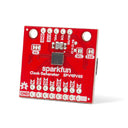SparkFun Clock Generator Breakout - 5P49V60 (Qwiic)
by Sparkfun






The SparkFun Qwiic Clock Generator breakout offers a wide range of customizable frequencies in a wide range of different signal types using a single reference clock.
Four (single output) clock outputs can generate frequencies from 1MHz-200MHz and eight (differential output) clock outputs can generate frequencies from 1MHz-350MHz. The frequency's many properties can be manipulated in code via I2C using the SparkFun Arduino Library.
There are two Qwiic connectors populated on the board to easily configure the clock generator without the need of soldering to the I2C lines. However, soldering is required to connect to the clock outputs. Additionally, there are four banks of programmable memory available for when it's ready to sit on its own within the project without a microcontroller.
Note: An oscilloscope is highly recommended to verify that the programmed clock signal is correct as its the only way to verify the output accurately.
The SparkFun Qwiic Connect System is an ecosystem of I2C sensors, actuators, shields and cables that make prototyping faster and less prone to error. All Qwiic-enabled boards use a common 1mm pitch, 4-pin JST connector. This reduces the amount of required PCB space, and polarized connections mean you can’t hook it up wrong.
Get started with the Qwiic Clock Generator guide
Features
- I2C serial programmable interface (Qwiic-enabled)
- Arduino Library to manipulate frequencies via I2C
- Two selectable addresses
- 0x6A (default) or 0x68
- 4x single ended clock outputs can generate frequencies from 1MHz-200MHz in the following signal output:
- LVCMOS
- 8x differential clock outputs can generate frequencies from 1MHz-350MHz in the following differential outputs:
- LVDS
- LVPECL
- HCSL
- Operating temperature range
- -40°C to +105°C
- Operating voltage range
- 1.8V, 2.5V, 3.3V
- Typically 3.3V using the Qwiic cable
- 4x One-Time Programmable (OTP) banks of programmable memory
- Programmable output enable or power-down mode
- Redundant clock inputs with manual switchover
- AEC-Q100 qualified
Documents
We no longer stock this product
It's sad to say goodbye but sometimes we have to retire products to make way for new things.
You may still be able to buy this product directly from our friends at Sparkfun - check out their website!
Shop with confidence – we've been serving the hobbyist electronics, Maker, and retro gaming communities since 2012.
- Satisfaction or refund guarantee
- Worldwide shipping via mail or courier
- 57,000+ customer reviews
- Secure website and payments